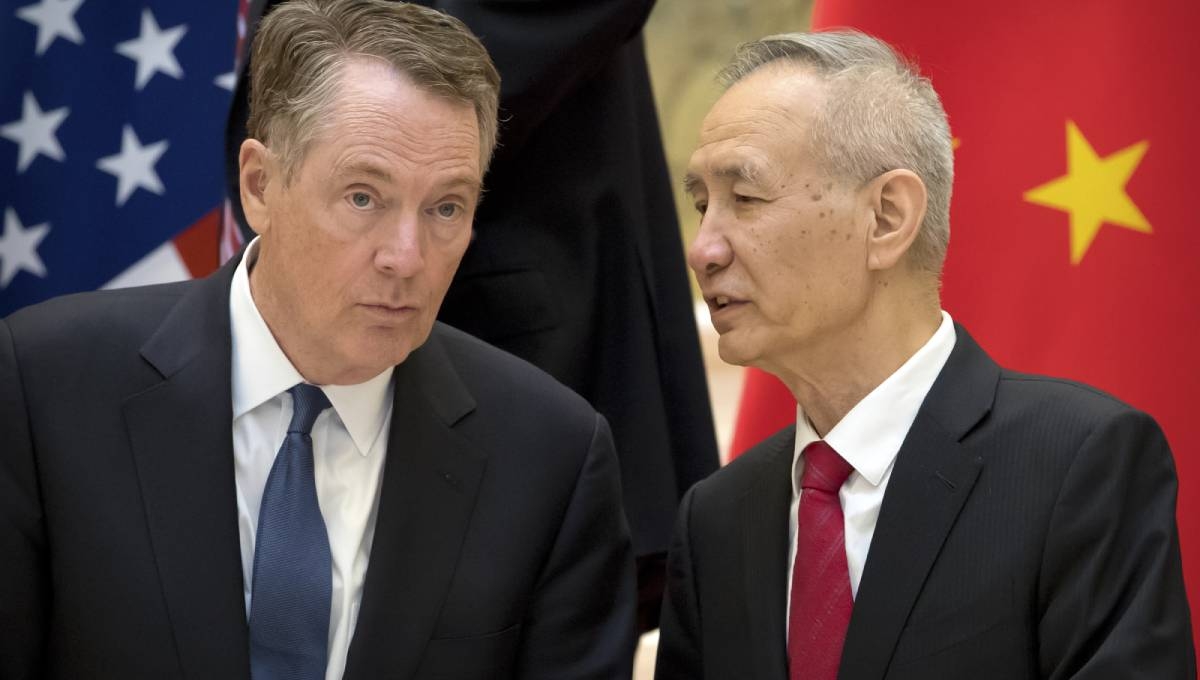US and China extend trade talks; Xi-Trump meeting may follow

U.S. and Chinese negotiators agreed Friday to extend high-level trade talks through the weekend, and President Donald Trump said he hoped to meet next month at his Florida resort with President Xi Jinping to try to finalize an agreement.
The news followed two days of negotiations in Washington aimed at resolving a trade war that has rattled financial markets and threatened global economic growth.
"We're making a lot of progress," Trump told reporters at the White House. "I think there's a very good chance that a deal can be made."
Treasury Secretary Steven Mnuchin said the negotiations, which had been scheduled to conclude Friday afternoon, would continue through Sunday. The Chinese delegation is led by Xi's special envoy, Vice Premier Liu He, the American team by Trade Representative Robert Lighthizer.
Trump had originally warned that he would escalate the tariffs he has imposed on $200 billion in Chinese imports, from 10 to 25 percent, if the two sides failed to reach a deal by March 2. But in recent days, and again on Friday, he raised the possibility of extending that deadline if negotiators were nearing an agreement.
The world's two biggest economies are sparring over U.S. allegations that Beijing uses predatory tactics in a drive to make Chinese companies world leaders in such advanced industries as robotics and driverless cars.
Those tactics, the Trump administration argues, include cyber-theft, unfair subsidies for state-owned Chinese companies, the use of regulations to hobble China's foreign competitors and pressure on American companies to hand over technology in exchange for access to the Chinese market.
The administration contends that Beijing has repeatedly failed to live up to its past commitments to open its markets and to treat foreign companies more fairly.
The president has imposed 25 percent tariffs on $50 billion in Chinese imports and 10 percent tariffs on $200 billion worth. The latter grouping would face the 25 percent tariffs, too, if no agreement is reached.
Beijing has lashed back with import taxes of its own on $110 billion in U.S. goods. These tariffs are heavily aimed at soybeans and other agricultural products in an effort to pressure Trump supporters in the U.S. farm belt.
On Friday, the president and his advisers provided few details on this week's negotiations. Trump did say the two sides had reached some agreement on currency manipulation but offered no specifics. The administration has worried that Beijing would blunt the impact of Trump's sanctions by manipulating its currency down to give Chinese companies a competitive edge in international markets.
Trump said both sides want to "make this a real deal."
"We want to make it a meaningful deal," the president said, "not a deal that's done and doesn't mean anything. We want to make this a deal that's going to last for many, many years and a deal that's going to be good for both countries."
Trump raised the possibility that the U.S. will drop criminal charges against Chinese telecommunications giant Huawei, saying the issue would be discussed with Attorney General Bill Barr and U.S. attorneys.
The U.S. has charged Huawei with lying about violating sanctions against Iran and with stealing trade secrets.
Asked about Huawei before the Oval Office meeting with Liu, Trump said that a decision on Huawei is pending, but "right now, it's not something we're discussing."
After Trump appeared with Liu, Agriculture Secretary Sonny Perdue announced that Beijing had agreed to buy 10 million metric tons of American soybeans, tweeting: "Hats off to @POTUS for bringing China to the table."
China's soybean tariffs have squeezed many American farmers. In the first 10 months of 2018, U.S. soybean exports to China dropped to 8.2 million metric tons from 21.4 million metric tons a year earlier — a 62 percent freefall, according to the Agriculture Department.
In front of Liu and the press corps, Trump ridiculed members of his own trade team for using the term "memoranda of understanding," or MOU, to describe the agreements they were working out with the Chinese.
"You either make a deal or you're not," Trump said. "To have these other agreements doesn't mean anything because they're not that meaningful in my opinion." Lighthizer at first defended the acronym, describing MOUs as binding contracts, then made light of the rebuke and vowed never to use the term again.
The U.S.-China conflict has rattled markets. It has also fanned uncertainty among businesses that must decide where to invest and whether Trump's tariffs — which raise the cost of imports on the target list — will last long enough to justify replacing Chinese suppliers with those from countries not subject to the tariffs.
The International Monetary Fund, the World Bank and the Organization for Economic Cooperation and Development have all downgraded their forecasts for the global economy, citing the heightened trade tensions.
The Chinese economy, in particular, is decelerating: The IMF expects China to record 6.2 percent growth this year, down from 6.6 percent in 2018.
"The Chinese economy is definitely hurting right now," said Timothy Keeler, partner at the law firm Mayer Brown and former chief of staff for the Office of the U.S. Trade Representative. "There's a lot of leverage for the U.S."
Myron Brilliant, head of international affairs at the U.S. Chamber of Commerce, said the two countries have yet to bridge their differences over nettlesome issues such as the forced technology transfer. He said the chamber wants to see an end to the tariffs between Washington and Beijing. But he also said American businesses are demanding a deal that would produce lasting improvement in Chinese trade practices.
"We simply can't go back to business as it was before," Brilliant said. Beijing, he said, has "got to deliver the goods."
